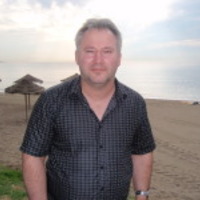
Klaus Dodds
I am a political geographer based at Royal Holloway, University of London who works in the fields of critical/popular geopolitics, media and popular culture (including James Bond) and the international politics of the Polar Regions and Oceans.
I was the editor of The Geographical Journal (2010-2015) published by the Royal Geographical Society and am editorial board member of journals such as Geopolitics, Political Geography, Marine Policy, Polar Record and Third World Quarterly .
My recent external roles including working for the House of Lords Select Committee on the Arctic as specialist adviser (2014-15)
I was the editor of The Geographical Journal (2010-2015) published by the Royal Geographical Society and am editorial board member of journals such as Geopolitics, Political Geography, Marine Policy, Polar Record and Third World Quarterly .
My recent external roles including working for the House of Lords Select Committee on the Arctic as specialist adviser (2014-15)
less
Related Authors
C. Michael Hall
University of Canterbury/Te Whare Wānanga o Waitaha
Greg Simons
Daffodil International University(DIU)
Lori Morimoto
University of Virginia
David Seamon
Kansas State University
Armando Marques-Guedes
UNL - New University of Lisbon
Jerome Bourdon
Tel Aviv University
Mustafa Aydin
Kadir Has University
Derek H Alderman
University of Tennessee Knoxville
Ian G Baird
University of Wisconsin-Madison
Petr Szczepanik
Charles University, Prague










Uploads
Books by Klaus Dodds
Shows why it is vital that we explore and attempt to understand how and why we divide the world into zones and territories - and how these divisions depend on your perspective.
Explains how terrorism, globalization, environmental degradation, and new technologies such as the internet are all challenging and complicating the geographical basis of global politics.
Looks at the history of terms such as 'the iron curtain', 'the third world', 'the axis of evil'.
Explains how geopolitics informs a government's foreign policy.
Geopolitics is a way of looking at the world: one that considers the links between political power, geography, and cultural diversity.
In certain places such as Iraq or Lebanon, moving a few feet either side of a territorial boundary can be a matter of life or death, dramatically highlighting the connections between place and politics. Even far away from these 'danger zones' - in Europe or the US for example - geopolitics remains an important part of everyday life.
peace is being transformed by our increasing
dependence on visual images. Dramatic pictures
ofterrorist acts,satellite photography ofweapons
ofmass destruction,digital snaps oftorture at
Abu Ghraib, bio-surveillance techniques like
retinal scanning,and closed circuit television
cameras all attest to the fact that the technologies
ofrepresentation and observation have become
essential military and diplomatic tools. Yet to date
there have been few attempts to examine the new
and complex ways in which visual culture and
statecraft are being fused.
Observant States brings together leading international scholars and commentators to explore the diverse aspects of this emerging field.
Papers by Klaus Dodds
Shows why it is vital that we explore and attempt to understand how and why we divide the world into zones and territories - and how these divisions depend on your perspective.
Explains how terrorism, globalization, environmental degradation, and new technologies such as the internet are all challenging and complicating the geographical basis of global politics.
Looks at the history of terms such as 'the iron curtain', 'the third world', 'the axis of evil'.
Explains how geopolitics informs a government's foreign policy.
Geopolitics is a way of looking at the world: one that considers the links between political power, geography, and cultural diversity.
In certain places such as Iraq or Lebanon, moving a few feet either side of a territorial boundary can be a matter of life or death, dramatically highlighting the connections between place and politics. Even far away from these 'danger zones' - in Europe or the US for example - geopolitics remains an important part of everyday life.
peace is being transformed by our increasing
dependence on visual images. Dramatic pictures
ofterrorist acts,satellite photography ofweapons
ofmass destruction,digital snaps oftorture at
Abu Ghraib, bio-surveillance techniques like
retinal scanning,and closed circuit television
cameras all attest to the fact that the technologies
ofrepresentation and observation have become
essential military and diplomatic tools. Yet to date
there have been few attempts to examine the new
and complex ways in which visual culture and
statecraft are being fused.
Observant States brings together leading international scholars and commentators to explore the diverse aspects of this emerging field.